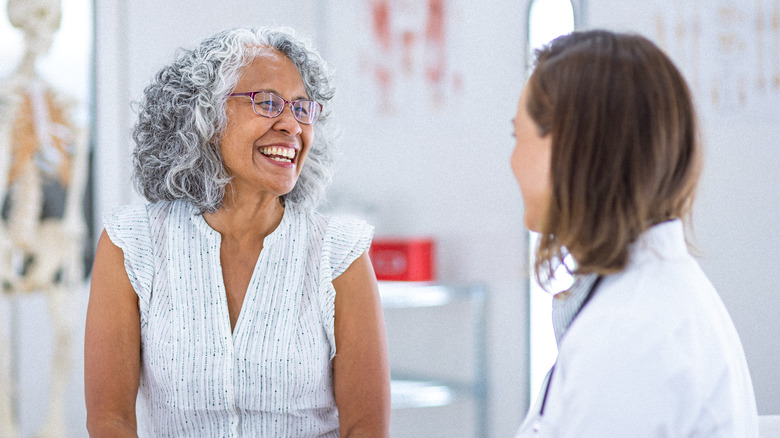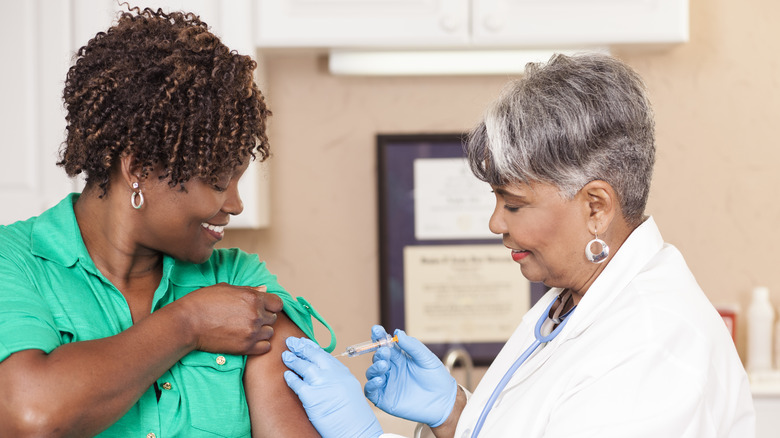Risky Health Mistakes You Should Avoid If You're Over 50
It's normal for people to develop some health issues as they age, especially once they are over 50. Nothing is ever guaranteed when it comes to health, of course, but taking precautionary measures to protect yourself can significantly improve your chances of living a long and fruitful life.
This is especially true when you consider the sobering statistics and the consequences of making the wrong choices. A wellness study conducted in 2023 by Alfac Incorporated found that one in four adults skipped medical checkups simply because they felt well enough. That survey also found that nearly 50% of adults have skipped at least one routine health screening, and 51% of participants who received a cancer diagnosis only found out after getting checked or screened.
Everyone is responsible for making responsible decisions to support their health. Prioritizing health screenings, especially after age 50 when the risk of developing some conditions naturally increases, is key to early detection. At the same time, identifying your own personal risk factors by learning your family's medical history can also be an invaluable tool in improving your health. Paying attention to lifestyle choices and making changes that support your longevity and wellbeing is equally crucial, whether it be cutting back on alcohol consumption or eating a healthier diet. By avoiding some of the most common mistakes that people tend to make after they reach 50, you can feel more confident that you'll live a healthier and more fulfilled life.
Forgetting to schedule regular health screenings
Although the United States Preventive Services Task Force (USPSTF) provides very clear guidance about which screenings both men and women should undergo once they're 50, that alone isn't always enough to push people to schedule that all-important appointment. Preventative care through screening, though, isn't just a casual suggestion; it is proven to be the game-changer where serious diagnoses are concerned.
That's because screenings themselves don't necessarily detect disease in its active form. According to the CDC, these routine appointments can help doctors detect precancerous symptoms, such as lesions and growths. Treating these as soon as possible, whether through surgical removal or medication, could reduce the chances of developing disease at all. Dr. Leana Wen, an emergency physician, explained to CNN, "Early treatment is key to improving survival rates, and that hinges on early diagnosis. This is why screenings are important."
The reasons for skipping these screenings vary. Some report that they can't afford the out-of-pocket cost of the visits, while others cite scheduling constraints as a primary concern. Others may simply be fearful of either the screening process itself or worry about the results. It's good to keep in mind that many straightforward screenings may already be a part of your routine, such as pap smears and blood pressure checks. However, some are specifically recommended for people once they reach 50, such as screenings for colorectal and lung cancers. You may alleviate some concerns about your health and feel more confident about your longevity.
Not making mental health a priority
According to the National Institutes of Health (NIH), adults are particularly at risk of developing major depressive disorder, which causes symptoms that last for at least two weeks. Others may be prone to persistent depressive disorder, a form of depression that causes symptoms that last for over two years. Others may become addicted to medication or experience significant changes in mood if their physical health declines.
That kind of change in mental health can lead to a loss of sense of self and make "[f]inding meaning in the day to day" a challenge, explains Niranjan Karnik, M.D., a psychiatrist at Rush University Medical Center, to NBC's Today. Purpose doesn't need to encapsulate major, life-changing goals or anything that puts you outside of your comfort zone, though. Simply taking up a new hobby or volunteering could give you the jolt of energy that you need to look forward to getting up in the morning.
This can be easier said than done among older adults who are depressed. Dr. Ronald Adelman, a co-chief of the Division of Geriatrics and Palliative Medicine for NewYork-Presbytarian/Weill Cornell Medical Center, says, "When an older person has untreated depression, he or she may lose interest in activities that previously held their interest, and retreat from social interaction and physical activities, which may eventually lead to loss of function" (via Health Matters). Staying connected with others and seeking the help of a professional, either for talk therapy or medication, can prove invaluable.
Neglecting to get enough physical activity
It's easy to fall into the trap of a sedentary lifestyle, but making regular physical activity an integral part of your routine is crucial if you're over 50. Regular workouts are linked to better health outcomes, as exercise can reduce the risk of developing ailments that are common among older adults. Those include hypertension, stroke, heart disease, diabetes, and osteoporosis.
The value of regular physical activity only increases as you grow older. That's because, beginning in their 30s, people can lose up to 5% of muscle mass per decade (per WebMD). This loss becomes more pronounced as people grow older — and can be a significant problem if you aren't active. The good news is that it's never too late to get started on your journey to improved physical fitness. "You can step up your game, essentially, in terms of diet and physical activity. Anything you can do at any age is going to make your future healthier and happier," says Norrina Allen, a preventive medicine associate professor at Northwestern University Feinberg School of Medicine, to the American Heart Association.
If you're easing into exercise or reconditioning your body after a long time, it's important to have a conversation with your doctor. Dr. Tamanna Singh, co-director of Cleveland Clinic's Sports Cardiology Center, recommends starting slow. "Oftentimes, for people who have never or barely exercised, I'll suggest walking and jogging because they don't require much outside of a good pair of sneakers," she tells Parade.
Making poor dietary choices a habit
Everyone has a vice or two that may not necessarily fall into the "healthy" category. It's completely fine to enjoy the foods that you love in moderation, whether it's the occasional croissant, an order of French fries, or a frothy, sweet coffee from your favorite cafe. Consistently eating foods that are high in saturated fat, sugar, and sodium, however, can increase the risk of developing serious health issues like type 2 diabetes, hypertension, heart disease, and other chronic conditions. Plus, your dietary needs change as you grow older, making it even more important to eat the right foods.
Katherine L. Tucker, Ph.D., a professor of nutritional epidemiology and the director of the Center for Population Health at the University of Massachusetts-Lowell, explains to Men's Health that fruits and vegetables are especially important because they contain the vital minerals, vitamins, and fiber that adults need even more as they age. Being mindful of your food while you eat is equally important, as taking the time to chew thoroughly can prevent you from overeating beyond the point of fullness.
Choosing more satiating foods and making smart choices becomes more critical, too. Bettina Mittendorfer, Ph.D., who's a research associate professor of medicine at St. Louis's Washington University, recommends avoiding empty calories. "A soda goes down quickly," she tells Men's Health. "Eat the equivalent in a salad, and you'll stay full longer."
Staying up too late at night
Those late nights can really take their toll. In fact, a 2021 study published in Current Opinion in Endocrine and Metabolic Research found that missing out on valuable shut-eye could accelerate the aging process and increase the risk of developing ailments such as heart disease and type 2 diabetes. Sleep also supports the body's immunity, which is vital to fighting infections. Per NIH recommendations, older adults should sleep at least seven to nine hours each night. Aging, though, can make it difficult to fall asleep, whether it's due to pain or chronic illness. That can have significant ramifications, leading to effects like depression, cognitive issues, and vulnerability to falls.
Research has even found that a lack of sleep beginning in the 50s could increase a person's chances of developing dementia later in life. There are a few reasons that could be to blame, explains Pamela Lutsey, an epidemiology and community health associate professor at the University of Minnesota. "Think of someone who is staying up too late and having snacks, or because they get very little sleep, they have low motivation for physical activity," she tells The New York Times. "That could predispose them to obesity and then things like diabetes and hypertension that have been pretty robustly linked to dementia risk."
Going to bed at the same time every night, waking up at the same time in the morning, and limiting caffeine intake may be helpful in improving your sleep hygiene, according to the CDC.
Squinting through significant vision changes
Changes to vision occur naturally over time. You might need to hold a magazine farther back to read the print more clearly, for example, or you may need to remove your glasses just to read text on your phone screen. Even if you never needed glasses before, that might change in your 50s. It's due to something called presbyopia, which refers to your eyes' newfound difficulty focusing. It only progresses with time, meaning you will eventually need to wear either bifocals (or even multifocal contact lenses).
Other common vision concerns that can occur with age include dry eyes, which can cause symptoms like stinging and burning, age-related macular degeneration (AMD), and floaters. Glaucoma, which causes fluid to build up and exert pressure inside the eyes, is a very common concern that worsens quietly over time. Symptoms typically aren't evident until the disease has reached a late stage, which is why it's crucial to schedule regular eye exams at least once every one to three years before the age of 54, according to the American Academy of Ophthalmology. Beyond age 55 and into your mid-60s, it's smart to schedule an appointment annually or every two years.
Although most people will experience some type of vision decline as they grow older, not everyone will develop serious eye conditions. You can take a proactive approach to your eye health simply by prioritizing visits to your ophthalmologist, allowing them to catch any changes to your vision early.
Skipping all-important scheduled vaccinations
Getting regular vaccinations is important at many stages of life — and it takes on particular importance with age because that's when immune health begins to decline. Older people are more vulnerable to developing diseases like shingles, the flu, and COVID-19. Dr. Trish Perl, an infectious diseases doctor at UT Southwestern Medical Center in Dallas, tells The Dallas Morning News, "Adult immunization is important. There are a lot of misconceptions. Most vaccines are extremely safe, with no side effects, and they're highly effective."
At a bare minimum, you should receive a shingles vaccine once you hit 50. That's in addition to the recommended annual flu shot and COVID-19 vaccine updates. If you don't already have a Tdap vaccine to prevent tetanus (t), diphtheria (d), and pertussis (p), more commonly known as whooping cough, you should get a dose, then follow that up with a Tdap booster at least once every 10 years, according to the CDC.
It's easy to lose track of your vaccination schedule, but your doctor keeps a record of every single shot you receive, and can hold you accountable when it's time for your shot, whether it's annually or a decade later. Your provider can also determine if you might benefit from other vaccines that could be necessary if you have a chronic condition like diabetes or heart disease, or if you have HIV or another immune disorder that affects your body's ability to efficiently stave off infections.
Drinking more alcohol than is safe
Gone are the days when you could potentially enjoy a few drinks without too much issue. As you age, consuming too much alcohol could exacerbate your risk of developing health problems like cancer and heart disease. In simple terms, though, your body simply handles alcohol differently right around the time you reach middle age.
"It's about age 50 that these biological processes start happening," Alexis Kuerbis, an associate professor at Hunter College of the City University of New York, tells the AARP. There are several reasons why the body metabolizes alcohol differently at this stage of life, but a big part of it is because of muscle loss and fat gain. Fat doesn't hold water like muscle, so you naturally have less water in your body as you age, too. That means your blood-alcohol level shoots up when you drink.
Plus, your body relies on a couple of key enzymes to break down the alcohol, namely alcohol dehydrogenase (ALDH) and aldehyde dehydrogenase (ADH). Those decline naturally with age and make you feel worse as you recover from drinking, explains Jim Schaefer, an expert in alcohol metabolism and professor of anthropology at Union College, to NBC News. "It has been suggested that acetaldehyde is one of the key toxic chemicals that influences the severity of a hangover. So any deterioration in ADH levels would contribute to worse hangovers." The solution? Stay sober if you don't drink at all, and consider scaling back if you do.
Not paying special attention to joint health
Joints undeniably take a beating over the years, something that you may be very well aware of if your body reminds you of the fact on a regular basis. Those effects make themselves loud and clear in the form of stiffness, aches, and pains that can affect everything from your elbows to your knees. The culprit is cartilage loss, which affects everyone as they age.
Cartilage is the slick tissue that buffers each end of your bones, creating a slippery barrier to protect your joints from shock. As it wears down, osteoarthritis may develop. "As we age, the one thing we can't change is the amount of time we've had on our joints," says Dominic King, sports medicine physician at the Cleveland Clinic's Orthopaedic and Rheumatologic Institute, to AARP. "So at 55 you have 55-year-old knees." While that may sound disheartening, there are steps you can take to protect your joints from worsening.
Getting regular exercise is key, as it makes your muscles more resilient and ensures nutrients reach your cartilage. Explains King, "Motion is lotion. The more you move, the more you're likely to keep moving. The worst thing you can do with osteoarthritis after 50 is be sedentary." He adds that it's equally important to manage your weight, as cartilage wears down faster when it can't bear the brunt of this excess pressure. Finally, King says that drinking enough water is crucial to keeping cartilage properly hydrated.









